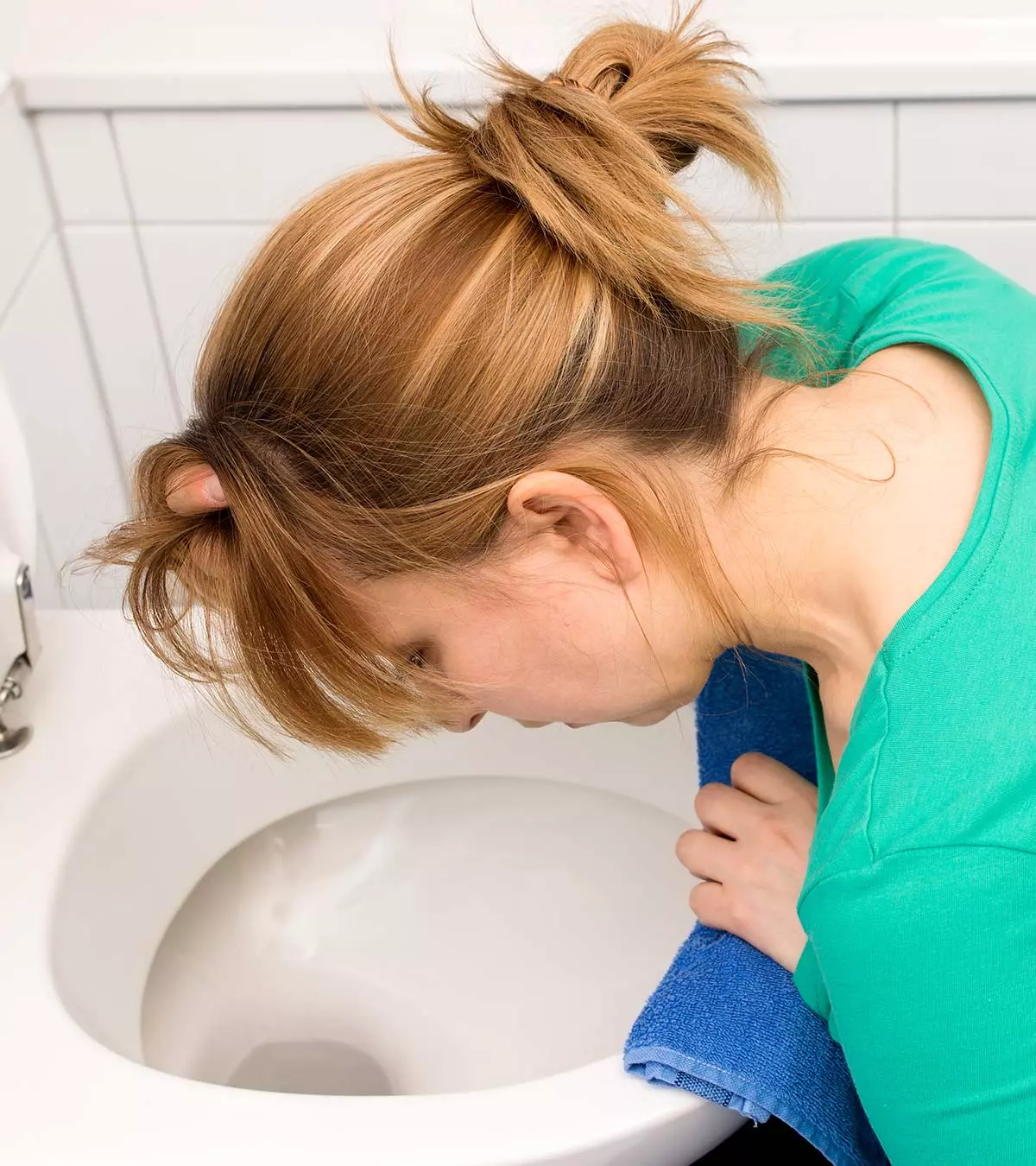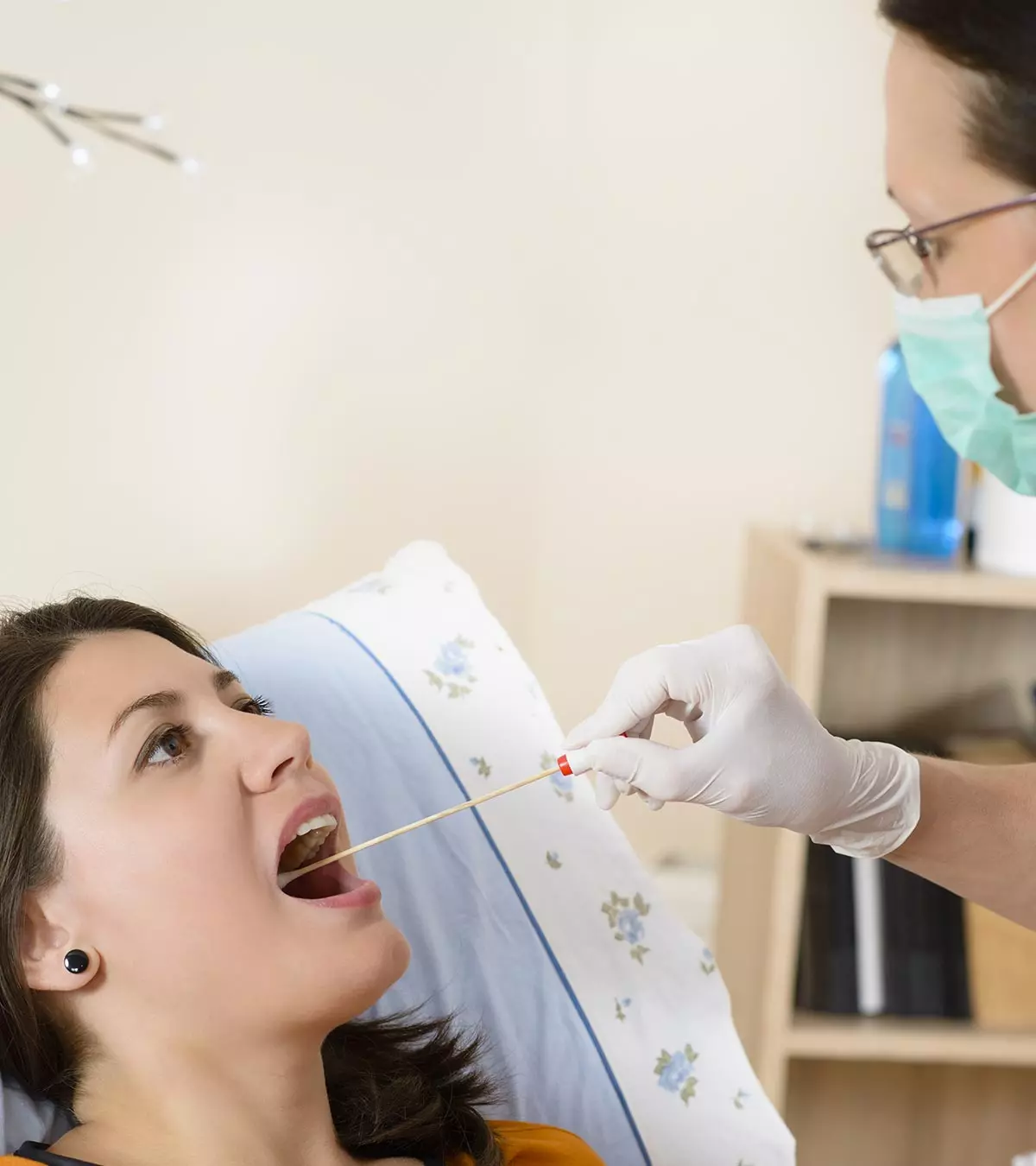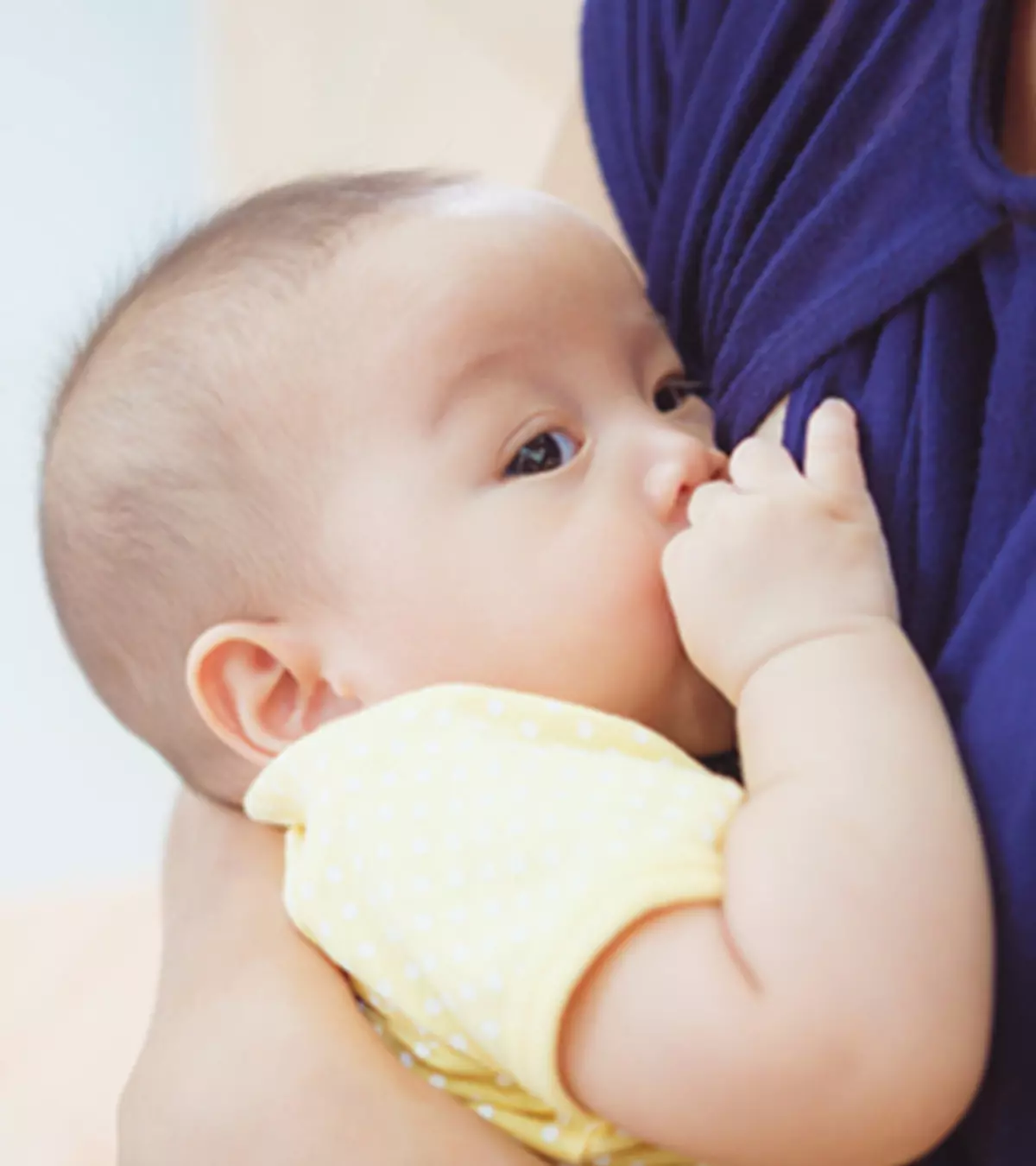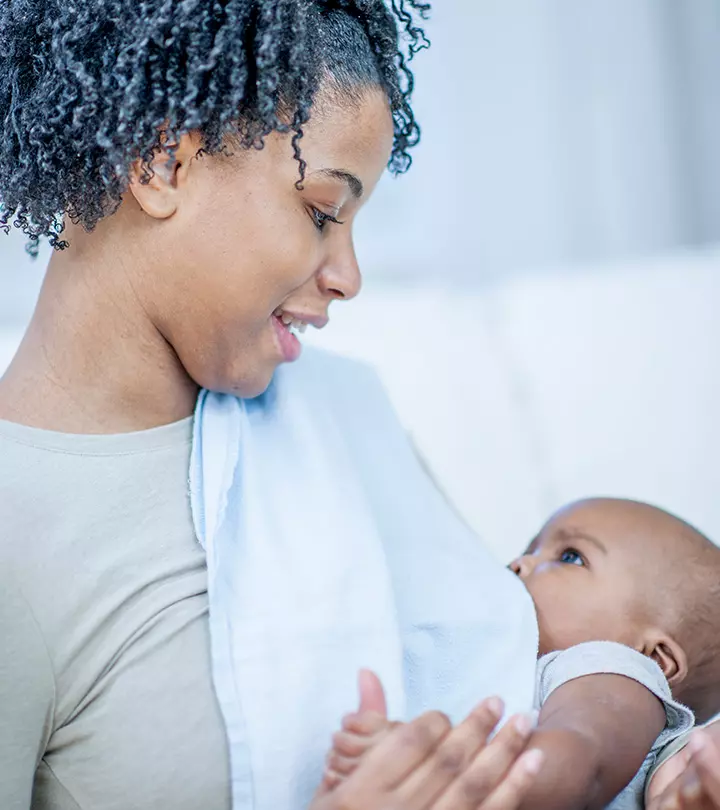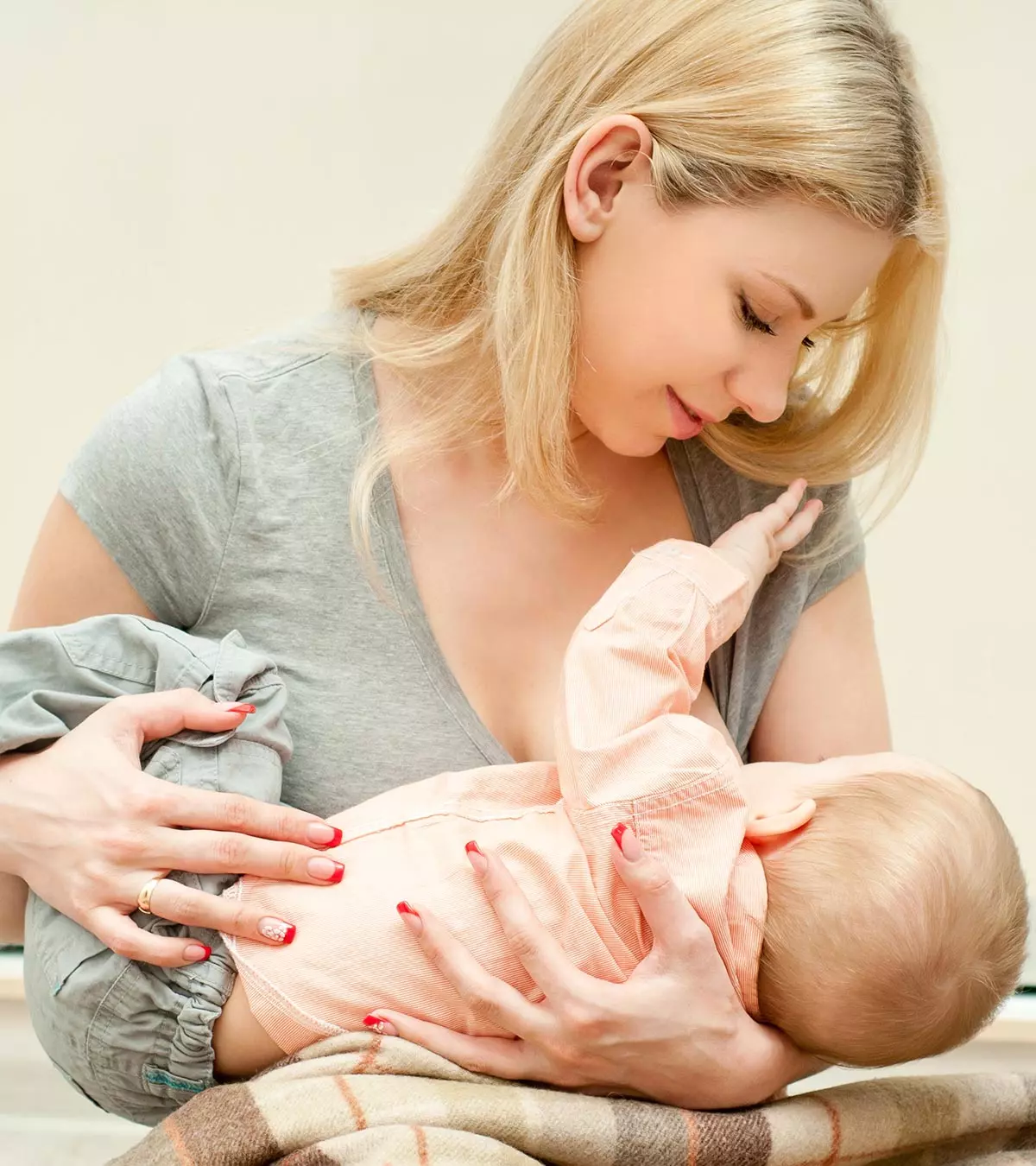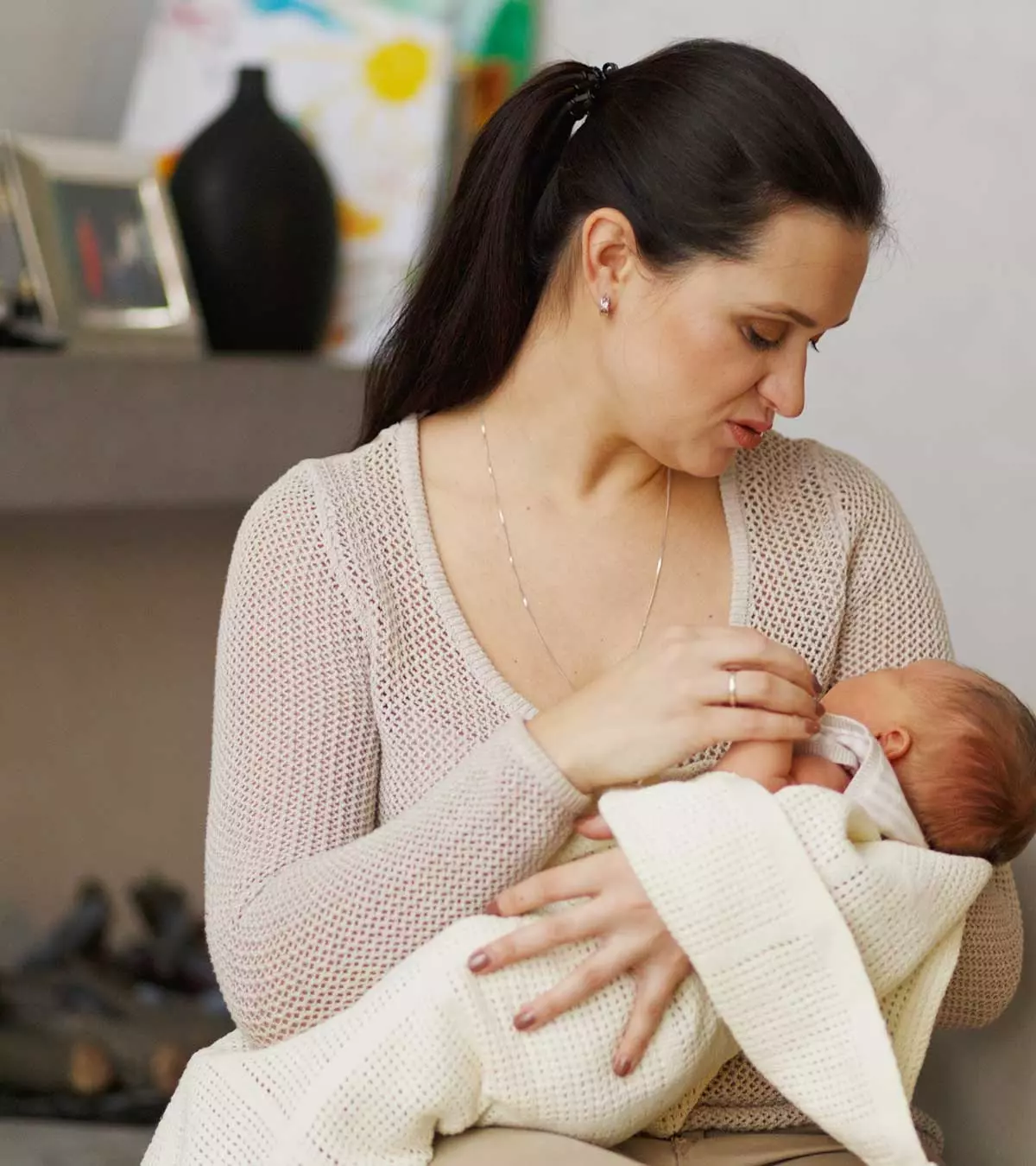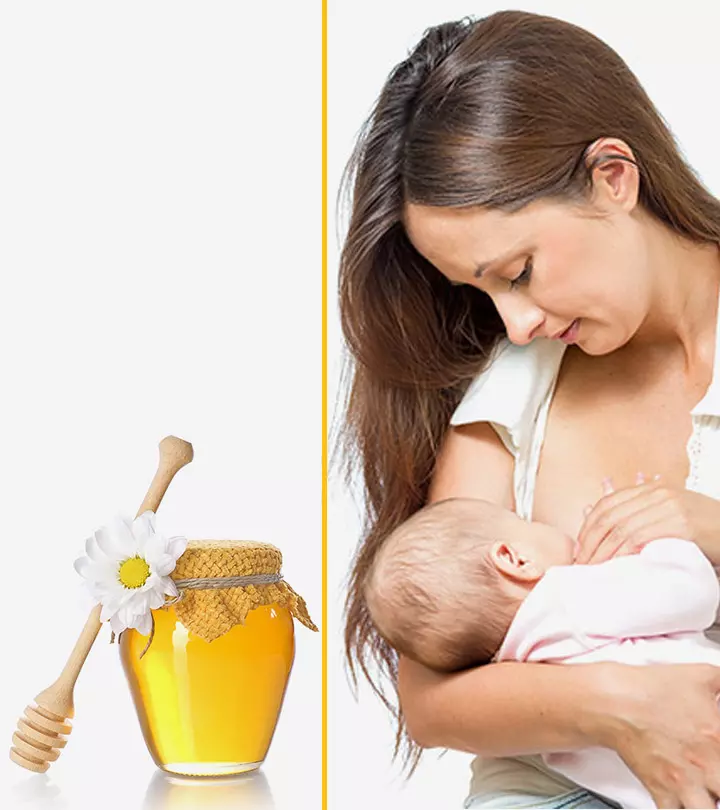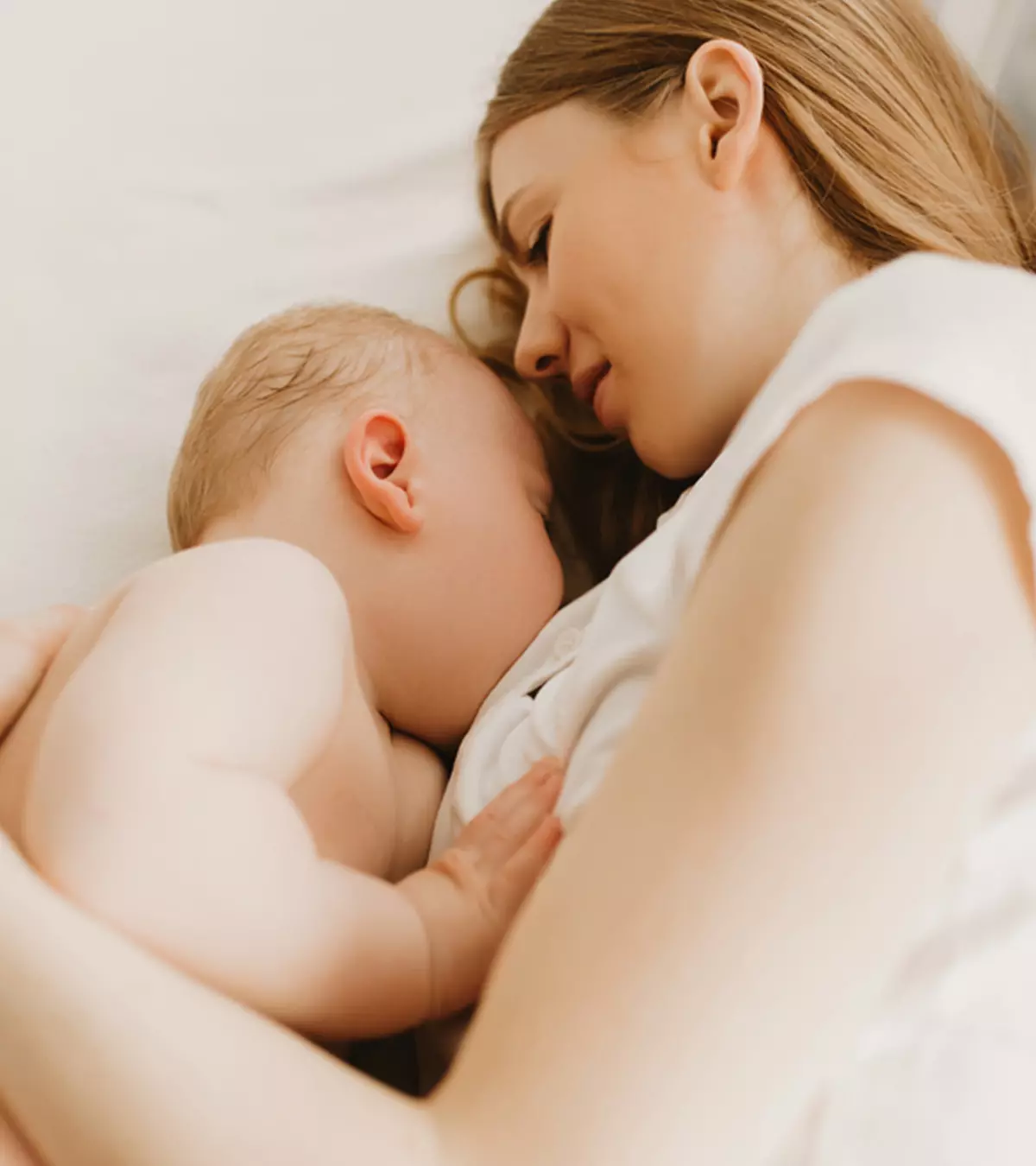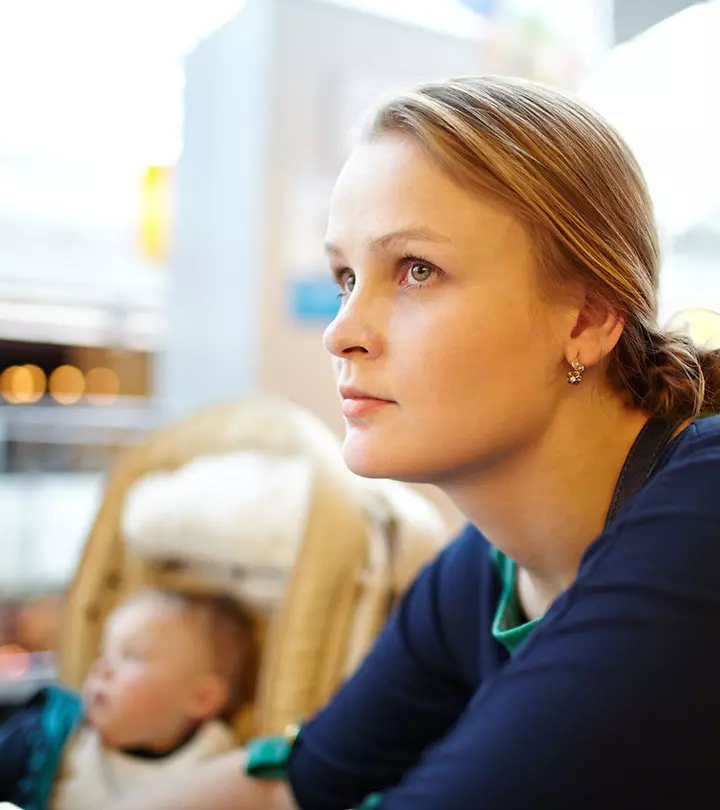
Image: ShutterStock
New moms sometimes believe that if they exclusively breastfeed, they may avoid getting their period. However, it is just a myth, raising the question of when to expect the first period after breastfeeding. The truth is that you might begin menstruation shortly after childbirth. Your postpartum menstruation may begin as soon as a few weeks after birth. However, there are instances when women might not be menstruating, even after a prolonged time postpartum. This condition is called lactational amenorrheaiAbsence of menstrual period in women, either temporarily or permanently (1). The lactational amenorrhea method is a lactational infertility that relies on the body’s natural mechanism of preventing ovulation while breastfeeding.

Continue reading to learn more about breastfeeding and menstruation.
Key Pointers
- Lactating women typically resume their regular menstrual cycle within three months after giving birth.
- Breastfeeding may cause lactational amenorrhea, where some women do not menstruate.
- Menstruation may alter the taste of breastmilk due to hormonal changes, but it does not impact the baby.
- Consult a doctor before choosing a birth control method as it may affect milk production.
Return Of Period While Breastfeeding
Your period shall return after the birth of your baby. If you are not breastfeeding, you can expect your cycle to return within three months. However, it might vary from mother to mother (2).
- Even if you are nursing, you can get your period. However, in some cases, your menstrual cycle may get delayed by about a year when you are breastfeeding. This delay occurs due to the increased prolactiniA hormone produced by the pituitary gland which causes the breasts to grow, develop, and produce milk release that inhibits estrogeniA sex hormone responsible for the development of female sexual characteristics levels required for ovulation, thus resulting in menstrual suppression.
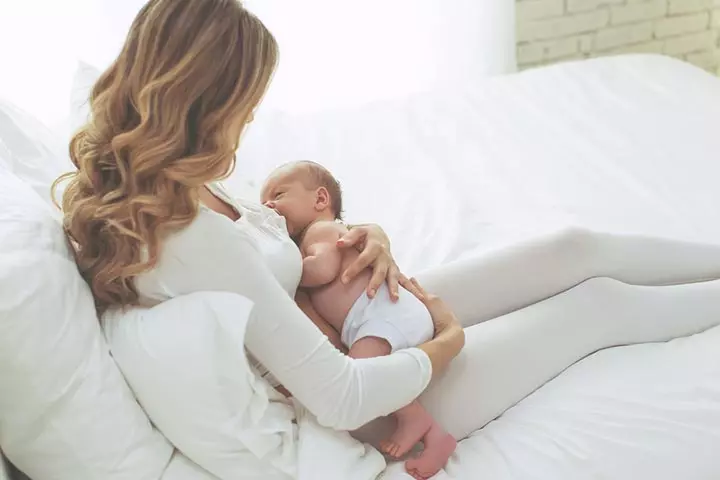
- When you are nursing round the clock, you can expect your cycles to stay away for greater lengths. However, when you are not feeding the baby or offering the baby a pacifier and start weaning, you may start menstruating. The National Health Service (NHS) states that when combining breastfeeding and bottle feeding, women may get their periods as early as five to six weeks after birth (3).
- In some cases, menstrual return may be delayed for a few months unless you have stopped breastfeeding completely. Although various factors like hormonal response and feeding practices play a role, most breastfeeding mothers get their periods back between 9 and 18 months after childbirth (2).
- Once your period returns, it will continue every month. It will not stop or discontinue even if you start breastfeeding again.
Jeannie, a mother of four, shares her experience with her first period after giving birth on her YouTube channel. She says, ” With this baby, I just got it at 8 months postpartum. About a week before I got it, my back was so sore and killing me, and I was probably ovulating. About two weeks later, I got my period, and it was super heavy and super awful. I was sweaty, bloated, my back hurt, and it lasted a while (ⅰ).’’
 Quick fact
Quick factBreastfeeding While You Are Menstruating
Often, mothers have the misconception that breastfeeding during menstruation is not a right thing to do.
- Infant feeding while having periods doesn’t cause any harm to them.
- The quality of your breast milk remains the same.
- The taste of your breast milk may change because of hormonal imbalance or changes that your body undergoes.
- Sometimes, you may notice a decrease in the milk supply. These occasional changes can make your little one a bit fussy. There is nothing to worry about. It’s all a natural phenomenon (3). According to childbirth and breastfeeding expert Mindy Cockeram, “Many – but not all – women notice a temporary drop in their milk supply during their menses. Anecdotally, staying adequately hydrated and eating well helps some women maintain their supply well during their period.”
- If you feel your milk production reduces while you have your periods, you might try to spend more time with your baby skin to skin or offer the breast more frequently.
- You can also talk to your doctor about mineral and vitamin supplements to ensure your little one gets sufficient milk. Sharing her insights on the topic, registered dietitian and lactation consultant Brittany Brown says, “The return of your menstrual cycle can sometimes cause a temporary dip in milk production. I often recommend a calcium and magnesium supplement to help minimize this drop and support the milk supply.”
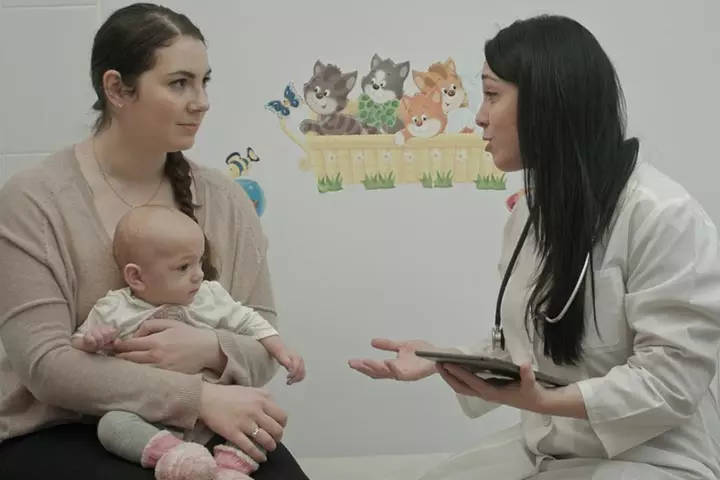
- You may also notice sore nipples. It is a condition that you may experience because of your menstruation cycle.
- It might get a little difficult for you to breastfeed your baby once your period starts, mostly because of the physical pain the phase brings with it. According to the American College of Obstetricians and Gynecologists (ACOG), common breastfeeding issues like breast fullness, soreness, and nipple pain can be relieved by applying cold packs and nursing more frequently (12).
- Try to apply coconut or olive oil to release soreness. Regular breastfeeding helps maintain a good supply of milk and also reduces the chances of problems like engorgementiEnlargement, swelling, or tightness felt in breasts due to milk retention , mastitisiSwollen, hot, or painful breasts due to bacterial infection , blebsiFluid-filled blisters and plugged milk ducts.
 Quick fact
Quick factFirst Period After Breastfeeding
After pregnancy, the first period may vary in intensity among women. It’s common to experience irregularities initially, with periods eventually becoming heavier or more intense. Some mothers may experience their first period while breastfeeding, while others might notice it as they begin to reduce feedings. Some women may also experience delayed or missed periods. Don’t fret; this is common, and your period should typically return to normal within a few months.
Additionally, some women may observe increased cramping and PMSiPhysical and emotional symptoms occurring before menstruation such as bloating, headache, irritability, and fatigue symptoms post-weaning. On the flip side, others notice a shift towards more regular periods with fewer PMS symptoms after pregnancy. These variations are also normal and part of the postpartum experience (5).
With the return of your period, your fertility also returns. However, keep in mind that you can still get pregnant even before your period starts. It may seem unusual, but the human body doesn’t follow strict rules. Here are few points you should learn about (4):
- You may start ovulatingi A stage in the female menstrual cycle when a mature egg is released from the ovary even before your period begins.

- In case you are not adopting the birth control measures, you may conceive again without getting the first postpartum period.
- If you do not wish to plan another pregnancy, rely on contraceptives.
- You can talk to your doctor about the birth control options. Make sure to tell the doctor about the type of birth control you use, since it might interfere with your milk production.
 Research finds
Research findsWhen To Seek Medical Care
Postpartum periods return at different times among women due to various factors and may be irregular at first. However, some symptoms shouldn’t be ignored and may require medical attention. Here are some signs to watch for (11) (4):
- Irregular periods for several months
- Heavy or unusual bleeding with large clots
- Sudden changes in the frequency or color of bleeding
- Longer menstrual cycles than usual
- Severe abdominal cramping or vaginal discomfort during periods
- Profuse sweating, dizziness, or breathing difficulty during periods
- Spotting or bleeding between cycles
- Pain or bleeding during intercourse
Frequently Asked Questions
1. Is the first period after giving birth heavy?
Yes, the first period after you give birth to your baby will be heavier than usual. This blood is called lochia, a mix of uterine tissue and blood (6) (7).
2. Is the first period after delivery brown?
Yes. The first period after delivery may be brown or fresh red. In a few days, it turns dark brown or pinkish-red. Gradually, it becomes lighter and disappears (8).
3. Can I use tampons for the first period after birth?
No. Since the wound at the site where the placentaiA temporary organ that develops during pregnancy and provides the fetus with oxygen and nutrients and the uterine wall join and the vaginal tear still have to heal, you cannot use tampons until you have had your six-week postnatal checkup (9).
4. Will my first period after birth be more painful?
Some women may experience a more painful first period because they may have a larger uterine cavity shedding more endometriumi The inner lining of the uterus or uterine cavity (10).
It is not known when exactly does your menstruation return after childbirth. Several factors may determine the resumption of menstruation after delivery. Breastfeeding mothers may get their periods back a little later than the mothers who do not breastfeed. The return of menstruation may be further delayed for mothers who exclusively breastfeed. However, it is unique, and some exclusively breastfeeding mothers may see the resumption of their periods sooner than others. It is best to use contraceptives if you do not wish to get pregnant again soon. Also, breastfeeding cannot be considered a reliable contraceptive method.
Infographic: What Conditions Cause Change In Periods After Childbirth?
Periods may change after childbirth. Some women may experience heavier periods, while others experience lighter periods. This infographic shares possible reasons for these changes to help mothers stay informed. Read the infographic and share it with nursing mothers who got their periods back recently. Illustration: Momjunction Design Team
Illustration: When To Expect First Period After Birth When Breastfeeding?
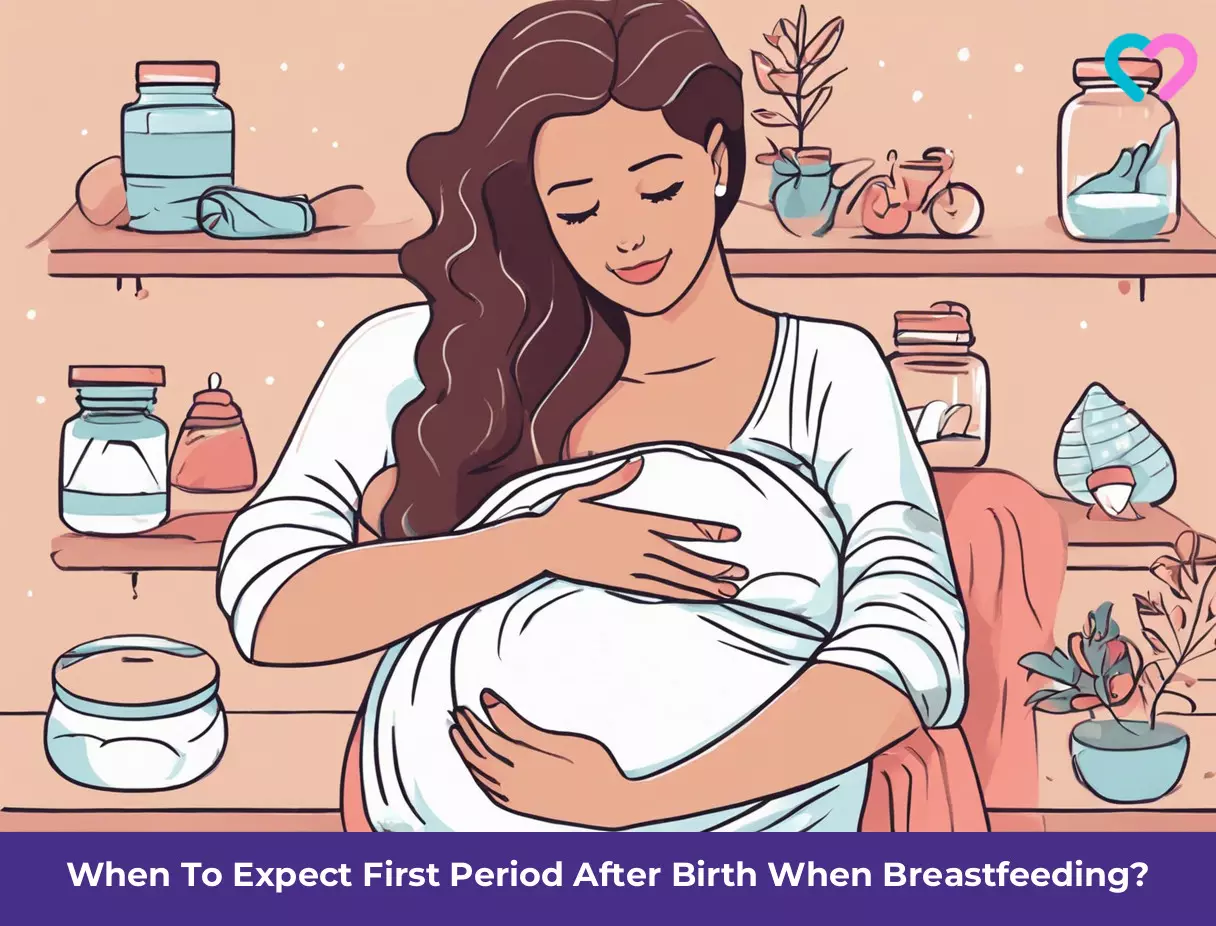
Image: Stable Diffusion/MomJunction Design Team
My period came back while breastfeeding and I’m not sure what to do! Learn how to manage your period while breastfeeding in this helpful video.
Personal Experience: Source
MomJunction articles include first-hand experiences to provide you with better insights through real-life narratives. Here are the sources of personal accounts referenced in this article.
i. First Period After Baby?!? GAAHHHH!!!!.https://www.youtube.com/watch?v=duDEU0qnIeYReferences
- Postpartum birth control.
https://www.acog.org/womens-health/faqs/postpartum-birth-control#:~:text=Lactational%20amenorrhea%20method%20(LAM)%20is - Menstruation and Breastfeeding
https://llli.org/breastfeeding-info/menstruation/ - Your body after the birth
https://www.nhs.uk/pregnancy/labour-and-birth/after-the-birth/your-body/ - Periods while breastfeeding.
https://www.healthdirect.gov.au/periods-while-breastfeeding - 4 Things That Might Surprise You About Weaning.
https://www.lancastergeneralhealth.org/health-hub-home/motherhood/the-first-year/4-things-that-might-surprise-you-about-weaning - Postpartum Discharge Instructions.
https://www.hopkinsmedicine.org/health/wellness-and-prevention/postpartum-mood-disorders-what-new-moms-need-to-know - Will my period change after pregnancy?
https://utswmed.org/medblog/period-changes-after-pregnancy/ - Bleeding after birth: 10 things you need to know.
https://www.nct.org.uk/information/labour-birth/recovery-birth/bleeding-after-birth-and-postpartum-haemorrhage-pph - How soon can I use tampons after giving birth?
https://www.nhs.uk/pregnancy/labour-and-birth/after-the-birth/your-body/#:~:text=You%20should%20not%20use%20tampons - Do Your Periods Change After Pregnancy?
https://health.clevelandclinic.org/do-your-periods-change-after-pregnancy - Periods after pregnancy
https://www.pregnancybirthbaby.org.au/periods-after-pregnancy# - Postpartum Pain Management.
https://www.acog.org/womens-health/faqs/postpartum-pain-management - Miriam H. Labbok et al. (1997); Multicenter Study of the Lactational Amenorrhea Method (LAM): I. Efficacy Duration and Implications for Clinical Application.
https://www.contraceptionjournal.org/article/S0010-7824(97)00040-1/pdf
Community Experiences
Join the conversation and become a part of our nurturing community! Share your stories, experiences, and insights to connect with fellow parents.
Read full bio of Rebecca Koyf

Brittany Brown is a dietitian, lactation consultant, and wellness advocate based in Nova Scotia, Canada. With over a decade of experience, she empowers families with evidence-based support in infant nutrition, breastfeeding, and mindful feeding. Passionate about community and holistic health, Brittany helps parents navigate feeding with confidence and clarity, ensuring every family feels nourished and supported on their journey.
Brittany Brown is a dietitian, lactation consultant, and wellness advocate based in Nova Scotia, Canada. With over a decade of experience, she empowers families with evidence-based support in infant nutrition, breastfeeding, and mindful feeding. Passionate about community and holistic health, Brittany helps parents navigate feeding with confidence and clarity, ensuring every family feels nourished and supported on their journey.
- Mindy Cockeram is a board-certified lactation consultant and runs her private practice in South Carolina. She trained as an antenatal teacher with the National Childbirth Trust (NCT) in London, England and taught childbirth classes for the NCT and St Georges Hospital Trust. Later, she relocated to the US.
 Mindy Cockeram is a board-certified lactation consultant and runs her private practice in South Carolina. She trained as an antenatal teacher with the National Childbirth Trust (NCT) in London, England and taught childbirth classes for the NCT and St Georges Hospital Trust. Later, she relocated to the US.
Mindy Cockeram is a board-certified lactation consultant and runs her private practice in South Carolina. She trained as an antenatal teacher with the National Childbirth Trust (NCT) in London, England and taught childbirth classes for the NCT and St Georges Hospital Trust. Later, she relocated to the US.
Read full bio of Jessica Albert
Read full bio of Rohit Garoo
Read full bio of Shinta Liz Sunny







